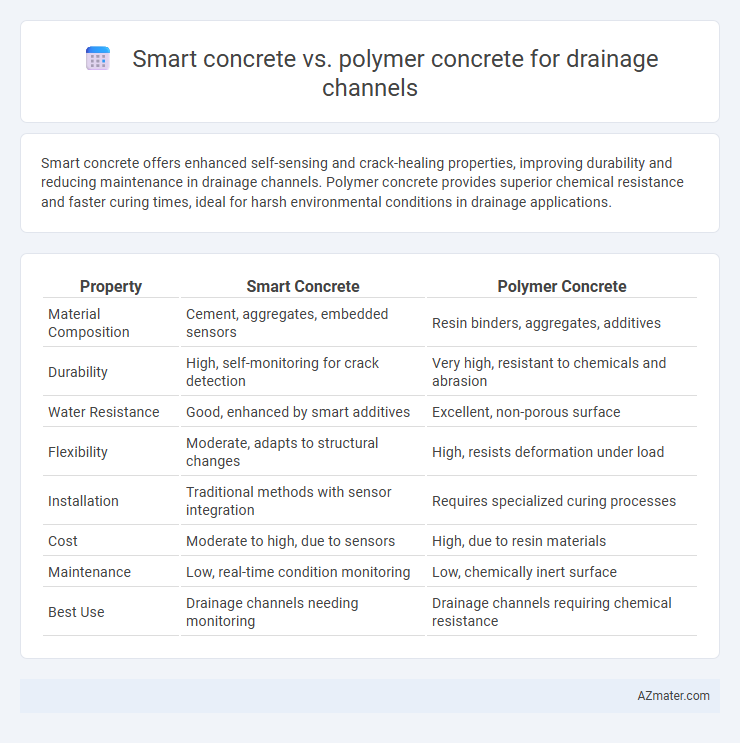Smart concrete offers enhanced self-sensing and crack-healing properties, improving durability and reducing maintenance in drainage channels. Polymer concrete provides superior chemical resistance and faster curing times, ideal for harsh environmental conditions in drainage applications.
Table of Comparison
| Property | Smart Concrete | Polymer Concrete |
|---|---|---|
| Material Composition | Cement, aggregates, embedded sensors | Resin binders, aggregates, additives |
| Durability | High, self-monitoring for crack detection | Very high, resistant to chemicals and abrasion |
| Water Resistance | Good, enhanced by smart additives | Excellent, non-porous surface |
| Flexibility | Moderate, adapts to structural changes | High, resists deformation under load |
| Installation | Traditional methods with sensor integration | Requires specialized curing processes |
| Cost | Moderate to high, due to sensors | High, due to resin materials |
| Maintenance | Low, real-time condition monitoring | Low, chemically inert surface |
| Best Use | Drainage channels needing monitoring | Drainage channels requiring chemical resistance |
Introduction to Advanced Concrete Solutions for Drainage Channels
Smart concrete incorporates self-sensing and self-healing properties through embedded nanomaterials and fibers, enhancing durability and reducing maintenance for drainage channels. Polymer concrete combines traditional aggregates with polymer resins, offering superior chemical resistance and fast curing times ideal for harsh drainage environments. Both advanced concrete solutions improve longevity and performance, with smart concrete focusing on adaptive functionality and polymer concrete emphasizing structural resilience.
What is Smart Concrete?
Smart concrete integrates sensors and self-healing materials to monitor structural health and automatically repair cracks, enhancing durability in drainage channels. Polymer concrete, composed of resin binders and aggregates, offers high chemical resistance and fast curing but lacks real-time monitoring capabilities. Smart concrete's embedded technology provides proactive maintenance advantages, making it a cutting-edge solution for sustainable drainage infrastructure.
Understanding Polymer Concrete
Polymer concrete offers superior chemical resistance, high compressive strength, and reduced permeability, making it ideal for drainage channels exposed to aggressive wastewater and environmental conditions. Unlike smart concrete, which incorporates self-sensing functionalities for structural health monitoring, polymer concrete focuses on durability and long-term performance in corrosive environments. Its composition of polymer binders and aggregates results in enhanced bonding and faster curing times, supporting efficient installation and maintenance of drainage infrastructure.
Key Material Properties: Strength and Durability
Smart concrete exhibits superior compressive strength and enhanced durability due to embedded sensors that enable real-time structural health monitoring, reducing maintenance costs for drainage channels. Polymer concrete offers excellent chemical resistance and high tensile strength, making it ideal for aggressive environments but may have lower long-term durability under heavy mechanical loads. Both materials provide distinct advantages, with smart concrete excelling in adaptive performance and polymer concrete in corrosion resistance for drainage infrastructure.
Installation and Maintenance Differences
Smart concrete for drainage channels offers self-sensing capabilities and adaptive crack repair, significantly reducing maintenance frequency compared to polymer concrete. Polymer concrete provides superior chemical and abrasion resistance with faster initial installation due to its prefabricated components, but it requires periodic sealing and repair for long-term durability. Installation of smart concrete demands specialized sensors and monitoring systems, whereas polymer concrete allows more straightforward, modular assembly with less technical expertise.
Performance in Harsh Environmental Conditions
Smart concrete exhibits superior durability and self-healing properties in harsh environmental conditions, significantly reducing crack formation and water infiltration in drainage channels. Polymer concrete demonstrates excellent chemical resistance and mechanical strength, making it highly effective against corrosion and abrasion from aggressive wastewater and extreme temperatures. Both materials enhance the longevity and performance of drainage infrastructure, with smart concrete excelling in adaptability and polymer concrete providing robust structural integrity.
Cost Comparison: Smart vs. Polymer Concrete
Smart concrete typically incurs higher initial costs due to embedded sensors and advanced materials, whereas polymer concrete offers a more moderate price point with durable chemical resistance suitable for drainage channels. Long-term maintenance expenses tend to be lower for smart concrete, as real-time monitoring reduces repair frequency and extends service life. Polymer concrete balances upfront affordability with robustness but may require more frequent inspections and maintenance, potentially increasing lifecycle costs.
Sustainability and Eco-friendliness
Smart concrete enhances sustainability in drainage channels by incorporating self-healing properties that reduce maintenance and extend lifespan, minimizing resource consumption over time. Polymer concrete offers eco-friendliness through its chemical resistance and durability, decreasing the need for frequent repairs and lowering environmental impact related to material replacement. Both materials contribute to sustainable infrastructure, but smart concrete's innovation in reducing lifecycle carbon footprint makes it a more eco-conscious choice for drainage applications.
Ideal Applications for Each Concrete Type
Smart concrete, embedded with sensors or self-healing properties, is ideal for drainage channels requiring real-time structural health monitoring and enhanced durability in high-traffic or harsh environmental conditions. Polymer concrete suits applications demanding superior chemical resistance and quick curing times, making it optimal for channels exposed to aggressive wastewater or rapid installation needs. Selecting between smart and polymer concrete hinges on prioritizing either advanced monitoring capabilities or chemical resilience for specific drainage scenarios.
Choosing the Right Concrete for Drainage Channels
Smart concrete enhances durability and self-healing capabilities, making it ideal for drainage channels exposed to dynamic loads and environmental stressors. Polymer concrete offers superior chemical resistance and rapid curing times, suitable for channels subjected to corrosive waste and requiring quick installation. Selecting the right concrete depends on balancing mechanical performance, environmental conditions, and maintenance needs specific to the drainage system.

Infographic: Smart concrete vs Polymer concrete for Drainage channel
 azmater.com
azmater.com